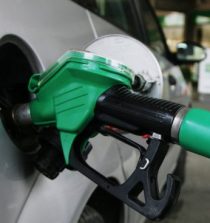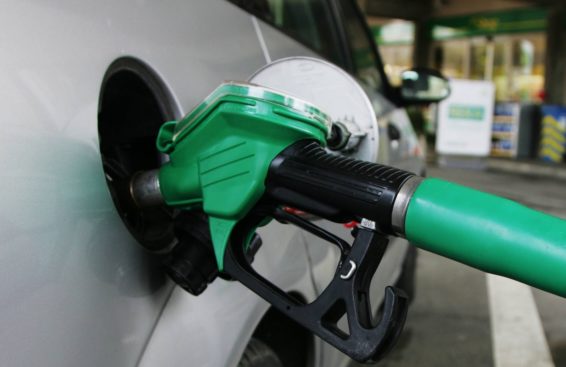THE prolonged petrol scarcity worsened in Lagos, Ogun and other states, yesterday, as independent marketers started lifting the product from private depots at N780 per litre, from N595 per litre, indicating an increase of 31 per cent.
The marketers believe the hike in price reflects the current demand and supply of the product in the domestic market.
Public Relations Officer of IPMAN, Chief Chinedu Ukadike, who confirmed this in an interview with Vanguard, also expressed optimism that the bad situation could improve in the coming days.
Chief Ukadike noted that more trucks have left the depots in the past few days, adding that though independent marketers are still sourcing the product at a higher rate, more marketers can load their trucks.
According to him, “NNPC has started releasing products to independent marketers. The queues you are seeing now are ghost queues. They appear in the morning but disappear in the afternoon or evening. It will continue like that until supply stabilizes in the coming days and becomes sufficient enough.
“You must also remember that we are in the rainy season and it takes some time for trucks to come up north. In a few days, I believe the situation will ease.”
Petrol distribution challenges, which have gone on for about six weeks have led to long queues at filling stations across the country with several marketers jerking up their pump prices.
Checks around Abuja yesterday showed that while queues have eased slightly at the stations around the central area, the supply situation remains tense in other parts of the Federal Capital Territory.
Pump prices also remained high, ranging from N685/litre at outlets operated by major marketers to N950/litre at stations managed by independent marketers.
He said: “So we sell as we can buy and put up markups and margins to be able to make little profit. The transportation cost is a lot higher now. The product we normally bring in at N800,000 now costs N3.5 million because of the high cost of diesel and maintenance cost of the trucks.”
He disclosed that IPMAN is still waiting to meet with the management of the Dangote Refinery ahead of the expected release of petrol from the refinery, stressing that independent marketers are determined to remove middlemen from their dealings with the refinery.
“We are still anticipating that Dangote will invite us as one of the major stakeholders in the downstream of the oil and gas distribution chain. We will be one of their major off-takers. We are serious about the issue of third parties and that this is what IPMAN is trying to erase. Third parties’ involvement increases cost of the product and we don¡¯t want that to happen,” he added.
Scarcity worsens in Lagos, Ogun, others
Checks indicated that the situation in Lagos, Ogun and other states that had recorded improvement in the past few days, yesterday, worsened as long fuel queues reappeared in many parts of the states.
There were several long queues at some filling stations, especially the outlets belonging to the NNPC and major oil marketers, which sold it at about N568 per litre while their independent counterparts sold it at between N900 and N950 per litre.
However, others without the product simply shut their gates against motorists and other buyers while hawkers were seen freely hawking it at higher prices, ranging between N1,000 and N1,500 per litre, depending on location.
Transporters lament, jerk up fares by over 200%
Further checks indicated that there was a significant increase in transport fares and motorists passed the cost of the high price to commuters in Lagos, Ogun and other states.
It now costs about N6,000 to travel from Ikorodu to Victoria Island, Lagos, a trip that used to cost less than N2,000 before the shortage.
Mr. Emmanuel Okonkwo, a Sienna bus driver who plies Lagos to Owerri said: “Naturally, the fuel scarcity is affecting our business negatively. Nowadays, there is no fixed fare for trips again, you fix what you like and the way it suits you to enable you remain in business. The worst aspect of it is that people are no longer traveling like before, hardly could one get full load in Toyota Sienna bus. If you are lucky to get full load, you should thank your star.
“In most cases you get four to five passengers and after all expenses, you discover that you are left with nothing to go home with. We are not finding it easy at all, because it takes a long time to get full load, departure and arrival time also have been affected. Drivers get to their destinations late as a result of queuing for fuel on the road.
“In most cases they have to sleep in any town before proceeding the next day due to fear of insecurity. In fact things are no longer the same.”
Another driver , who operates from Lagos to Port Harcourt, Mr. Eugene Eze noted that the scarcity was affecting their business because they queue all day to get fuel and at the end not having passengers on ground like before. He said that outside Lagos, fuel is sold at between N900 to N1,000, and this affects our profit.
He said: “We are working for nothing under the present fuel scarcity situation. The dilemma is that we can’t increase fares because passengers cannot afford the high fares.
“The danger is that we will be out of business if the fuel price continues the way it is. The vehicle maintenance is getting higher by the day and the option is to stop putting the vehicles on the road.
“Presently drivers spend a full day to search for fuel which they purchase at very high price. Our business is heading towards extinction. We are not even talking about extortion by local government officials and law enforcement agents on the road that collect toll fares from the transporters. It is very tough for us. Government should hear our cry and help us before we become unemployed,” he said.
Price rises as few depots have product
A visit to some depots in Lagos, including at Satellite Town yesterday, indicated that many of them have depleted their stocks, thus resulting in price hike.
However, it was gathered that some operators have concluded plans to further increase their depot prices to N800 per litre, from over N780 per litre.
Regulator not monitoring
The checks indicated that officials of the Nigerian Midstream and Downstream Petroleum Regulatory Authority, NMDPRA, were not physically present at filling stations to monitor activities, thus culminating in irregularities, including pump manipulation.
Rains, lightning, thunderstorms, cause of shortage — NNPC
However, NNPCL’s Vice President (Downstream), Dapo Segun, attributed the shortage to rains, lightning and thunderstorms.
Speaking during a press conference at the NNPC Towers, he said: “We apologise to Nigerians for the fuel queues. Many of the challenges we’re facing are outside our control, but we’re doing our best to address them.
“The recent rains have made the Escravos channel difficult to navigate due to siltation, which has significantly hindered our ability to transport petroleum products, especially PMS, across the country.”
He said lightning and thunderstorms culminated in suspension of fuel discharges, adding that the situation is worsened by the poor states of roads in the country
Nigeria becoming failed state — PENGASSAN
However, President of the Petroleum and Natural Gas Senior Staff Association of Nigeria, PENGASSAN, Engr. Festus Osifo, who is also President of the Trade Union Congress TUC, attributed Nigeria’s current economic hardship to government policies like floating of the currency.
Engr. Osifo stated the above in his address on Wednesday in Abuja, at the 3rd edition of PENGASSAN Energy and Labour Summit with the theme, “The future of Nigeria’s oil and gas industry: Energy mix, energy security, artificial intelligence, divestment and crude oil theft.”
He said: “A country that cannot meet its energy needs or guarantee energy availability for its citizens is on the path of becoming a failed state.
“As an association, we have mounted the rostrum over time, both on the streets and in the boardroom, to champion this cause, and we will not relent until victory is certain.
“As we gather here, let us not lose sight of the broader state of our nation. Nigeria stands at the crossroads, and our actions and decisions here in the next few days will provide a framework for a policy thrust for government towards shaping the economic outlook of our country.
“It is incumbent upon us to drive positive change, foster economic growth, and ensure our people’s prosperity. Recent policy directions by the government have placed untold hardship on Nigerians. Chief among them is flotation cum devaluation of the Naira, which saw our currency sliding from 450 Naira officially in May 2023 to the current exchange rate of about 1,600 Naira.
“This is the reason why the landing price of PMS today is over 1,000 Naira (reintroduction of subsidy), the reason why AGO is selling for over 1,300 Naira, and the reason why all imported commodities are over the roof today. The over-arching impact of this on Nigerians can only be imagined rather than experienced.”
Source: Vanguard










